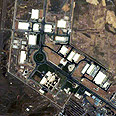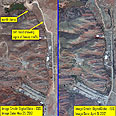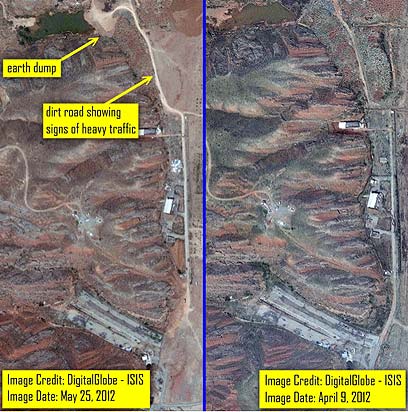

The Institute for Science and International Security (ISIS) said Thursday that new satellite images indicate that Iran is continuing in its efforts to "destroy evidence" of suspected nuclear activity.
"The images shows what appears to be further sanitization activity at the site in the Parchin military complex, where Iran is suspected to have conducted high explosive tests pertinent to the development of nuclear weapons," ISIS said.
Related stories:
- Diplomats: Image shows buildings gone at Iran site
- Iran's Ahmadinejad 'not afraid' of Israeli strike
- 'Iran nuclear talks plagued by mistrust'
- 'Iran nuclear talks plagued by mistrust'
The images also support the latest International Atomic Energy Agency report.
The UN nuclear watchdog stated that "based on satellite imagery, at this location, where virtually no activity had been observed for a number of years, the buildings of interest to the Agency are now subject to extensive activities that could hamper the Agency’s ability to undertake effective verification."

Parchin military base in Iran (Image: DigitalGlobe-ISIS)
Western envoys who attended Wednesday's briefing said that two small side buildings at the Parchin military facility had been removed and ISIS said that they "have been completely razed."
The disclosure followed inconclusive talks between Iran and six world powers in Baghdad last week to address concerns about the nature of its nuclear activities, which Iran says are aimed at generating electricity.
"Heavy machinery tracks and extensive evidence of earth displacement is also visible throughout the interior as well as the exterior of the site's perimeter," the think-tank said.
The UN International Atomic Energy Agency (IAEA) has repeatedly asked Iran for access to Parchin as part of a long-stalled probe into suspicions that Tehran may be seeking the ability to assemble nuclear bombs, should it decide to do so.
The Islamic state has so far refused to let inspectors visit the facility – which it describes as a conventional military complex – saying there must first be a broader framework agreement on how to address the IAEA's questions.
Iran's IAEA envoy, Ali Asghar Soltanieh, dismissed such accusations by Western officials, telling reporters after the briefing at IAEA headquarters that "this kind of noise and allegations are baseless."
Reuters contributed to this report
- Receive Ynetnews updates
directly to your desktop














